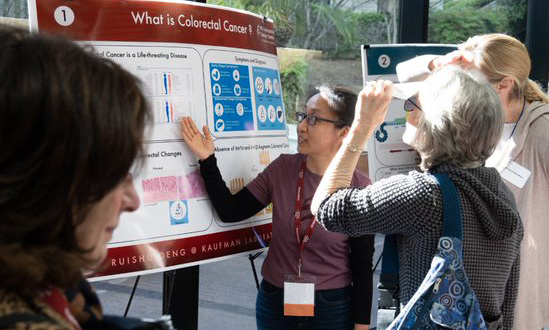Cancer Center open house connects San Diego community with scientists working toward cancer cures
The Institute’s NCI-designated Cancer Center hosted an open house to showcase the latest research advances in cancers of the digestive system. The event was sponsored by the center’s Community Advisory Board (CAB), which provides a link to community networks of people—including patients, survivors and their loved ones.
“These events are especially helpful for people affected by cancer because our researchers can explain the science behind the disease and the approaches we use to find new treatments,” says Associate Professor Cosimo Commisso, PhD, who co-hosted the event with Adjunct Associate Professor Pamela Itkin-Ansari, PhD “As researchers, it’s critical that we have community participation to influence our research—so we benefit as well.”
The open house, which was free to the public, fulfills a key part of the CAB’s mission—to create awareness of the cancer research being done at the Institute and to promote dialogue between its scientists and the community. Guests had the chance to mingle with cancer researchers, and there was also a panelist table, where they could ask questions directly to a panel including two cancer survivors and a clinician.
The theme of the open house was cancers of the digestive system, which includes pancreatic cancer, liver cancer, stomach cancer and colorectal cancer. Although these cancers are very diverse, one thing many cancers of the digestive system have in common is that they take a long time to diagnose and are difficult to treat.
“These are devastating cancers,” says Commisso. “We’ve doubled the survival rates for pancreatic cancer since I started working in this field over a decade ago, but it’s still only around 10%. And that’s just not good enough.”
Attendees also got behind-the-scenes tours of labs, including Commisso’s, where researchers are working to halt pancreatic cancer by blocking nutrients—in essence, starving tumor cells of the fuel they need to grow and proliferate.
“We have a lot of researchers taking different approaches to cancer here at the Institute, and it’s important for people affected by cancer to know that while we’re still a long way off from ending cancer forever, we’re still making progress,” adds Commisso.
